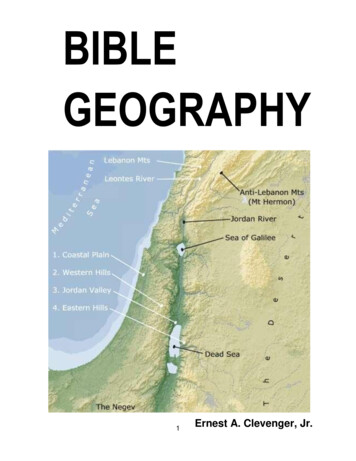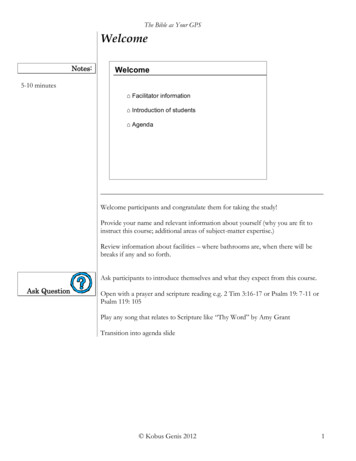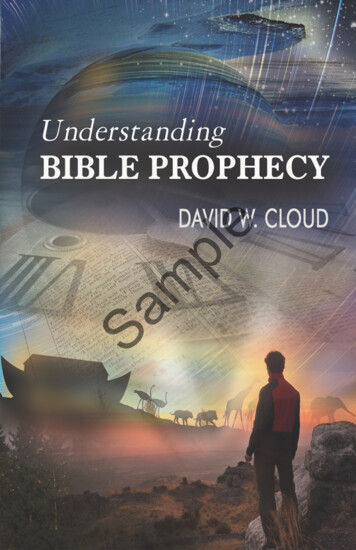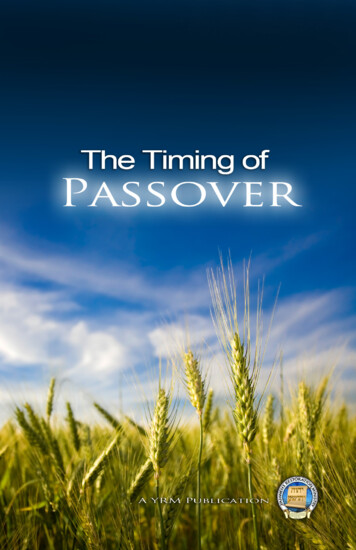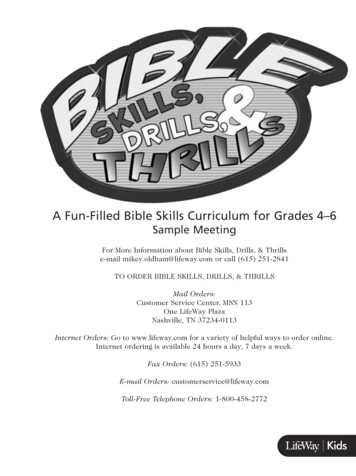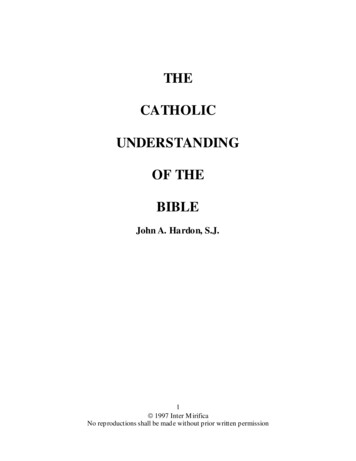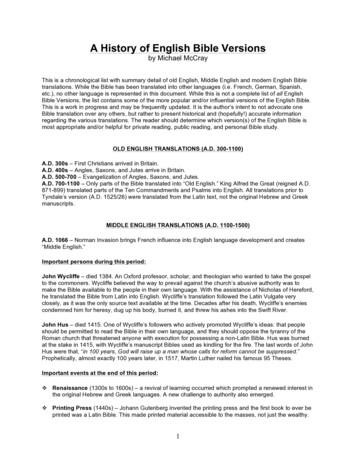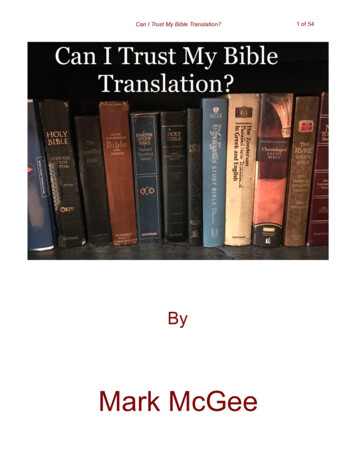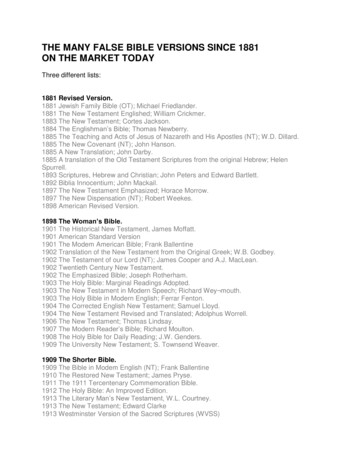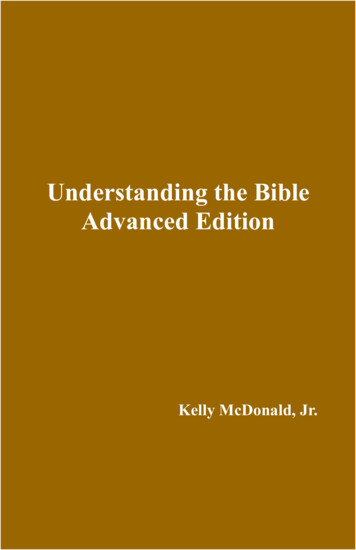
Transcription
Understanding the BibleAdvanced EditionKelly McDonald, Jr.
Understanding the BibleAdvanced EditionPlease read the Beginners Edition BeforeReading this booklet.Kelly McDonald, Jr.
Published by Hungry Hearts MinistriesPO Box 10334Jackson TN 38308hungryheartsmin@aol.comAll rights reserved.Printing by Allegra Print and Imaging1029 Old Hickory Blvd, Jackson TN 38305,(731) 664-1676First Edition Published April 2015Special thanks to Freda Sims for proofreading this bookAll Scripture notations, unless otherwise noted, come from theNew International Version. International Bible Society, Zondervan Bible Publishers Grand Rapids, Michigan 46506 USA.All language references, unless otherwise noted, come fromStrong’s Concordance. Strong, James. Published: Nashville: Abingdon, c1980.4
Table of ContentsIntroduction . 6The Problem with Translation . 7Studying the Bible: Advanced . 10Hebraic Thought . 14Other Hungry Hearts Resources . 20About Hungry Hearts Ministries . 21About the Author . 225
IntroductionIn this booklet, we are going to look at some more advancedstudy methods of the Bible. It is suggested that you read the beginners book before we look deeper into this advanced booklet.There are some things I may reference here that were discussedmore in-depth in the beginner’s guide. Paul informs us that theBible was fit for four things:2 Timothy 4:16-17“16 All scripture is given by inspiration of God, and is profitablefor doctrine, for reproof, for correction, for instruction in righteousness:17 That the man of God may be perfect, thoroughly furnished unto all good works.”We learn that the scripture is breathed by God. Therefore it takeshis breath, or Spirit, to help us understand it. This is why I emphasize prayer before you read or study the Bible.1) We can use the Word for doctrine. We tend to slander the worddoctrine in the church today. Doctrine is simply the teachings ofthe Bible.2) We can correct people or expose fault with the Word.3) We can reform people through the Word. This is walking themthrough the steps of conversion from a worldly lifestyle to aGodly lifestyle.4) We teach righteous living with the Word. This means teachingright living for God as one of His Children.I will simply pass onto you a series of deeper study methods Godhas shown me over the years so you can get the most out of yourBible. Enjoy this work as I pass years of tips and nuggets ontoyou.6
The Problem with TranslationThere is a tremendous argument in the Body of Christ over whichversion of the Bible we should use to read and study the Bible.Some say to go with an older version like the King James Version, while others say to go for an easier to read version like theNew International Version.I want to point out first and foremost that all Bible translationshave issues. The Old Testament was originally written in Hebrewwith some Aramaic. The New Testament was originally written inGreek. The original texts in Hebrew, Aramaic, and Greek are God-breathed. The teachings of the Bible are infallible.Since men translated the Bible, then there can be issues with different translations. This is why all translations have issues. Theoriginal teachings are infallible while translations of the Bible canhave issues. Why is this? Humans far removed from the time ofJesus do the translating.Some translations, such as the King James Version, use languagethat is outdated. It was written in 1611 in Shakespearean English.For instance, I Peter 1:15-16 reads, “15 But as he which hathcalled you is holy, so be ye holy in all manner of conversation;16 Because it is written, Be ye holy; for I am holy.”From a modern perspective, the phrase “all manner of conversation” would basically mean your conversations or speech withother people. In 1611, this phrase meant – everything you do. Peter is telling us to be holy in everything we do.I will give you one more example of language used in the KingJames that is no longer applicable today. James 2:2 reads, “For ifthere come unto your assembly a man with a gold ring, in goodlyapparel, and there come in also a poor man in vile raiment;” Theword raiment is not used in modern English. It was used in 1611to refer to clothing or apparel.7
As you can see, the time period that a translation was written incan affect the way you read it. You need a dictionary to understand some unused English words in an older version of the Bible.The other problem with translation is choosing which word orwords in the English language best convey the Hebrew, Aramaic,or Greek word that is found in the original Bible manuscripts. Thewriters of the Bible had a culture very different from our own.They had “slang” like we have slang. These factors make translation a delicate process. It must be done carefully and with the inspiration of God’s Spirit.The big argument over which translation to use is translationbased upon Word for Word or Thought for Thought. Some translations try to translate every word in Greek into a correspondingword or two in the English language. The King James and NewKing James are examples of this.Other translations try to capture the thought that is being conveyed and not just the individual words themselves. They are taking the Words used and conveying the entire thought being expressed by the writer. The New International Version and NewLiving Translation are examples of this. Some translations takethe thought for thought translation too far. The Message Bible isone example. In my opinion, it translates in such a modernthought that the original cultural context is nearly lost. This is myopinion, as some people do use this translation.When choosing a translation, I always recommend an easy to readversion. This is especially true in evangelism efforts. The KingJames Version is often used with concordances, so you will endup reading it by default many times when you study deeper.Older versions of the Bible, such as the KJV, were revolutionaryat the time in which they were written. However, we have mucholder original manuscripts today than we did 400 years ago. An8
older manuscript means it was written closer to the time that theevents actually happened in. TThe Bible is simply copies of copies of copies going all the wayback to the original writings.For example, Paul wrote his letter to the Galatians around 53 AD.Since his original letter, people have been making copies uponcopies until our modern day. As we discover older copies that arecloser to 53 AD, we are getting much closer in finding the mostaccurate copy of his letter. More modern translations today arebased upon older, more trusted documents. Furthermore, the English language has significantly changed. Newer translations haveupdated language.I usually recommend cross checking the meaning of a verse withdifferent translations to see how multiple versions translate it.http://biblehub.com/ is a great website where you can type in oneverse and see how it is translated by many different versions.I usually look at the King James and New International Version.If necessary, I check the New King James, Revised Standard Version, and New American Standard Bible when the literal meaningis not easy to ascertain.The contexts are also extremely important to help you ascertainthe meaning of a verse. I went over 5 types of context in the lastbooklet. I will go over 7 more in the next chapter.After saying all of this, keep in mind that the Bible is Godbreathed. I am not trying to confuse you with this information,but rather to you. Use the version of the Bible that the Lord leadsyou to use.9
Studying the Bible - AdvancedIn this chapter, we are going to look at an additional 7 types ofcontext that are considered a little more advanced than the first 5types discussed in the earlier chapter.7 More Types of Context for any verse in the Bible:1) In Author2) In Symbol3) In Language or Word4) In Covenant5) Historical6) Cultural7) Location1) In Author Context – Sometimes a specific author addresses asubject over the course of all the books they have written.For instance, Luke was the author of both the gospel of Luke andthe book of Acts. At the end of the book of Luke, he wrote:Luke 24:47-49“47 and repentance for the forgiveness of sins will be preached inhis name to all nations, beginning at Jerusalem. 48 You are witnesses of these things. 49 I am going to send you what my Fatherhas promised; but stay in the city until you have been clothedwith power from on high.”In the opening of Acts, we find:Acts 1:4, 84 On one occasion, while he was eating with them, he gave themthis command: “Do not leave Jerusalem, but wait for the gift myFather promised, which you have heard me speak about .8 Butyou will receive power when the Holy Spirit comes on you; and10
you will be my witnesses in Jerusalem, and in all Judea andSamaria, and to the ends of the earth.”When we connect them, we see a story line ending in Luke andpicking back up in Acts. Try to connect the different books that aspecific author has written.2) In Symbol – Sometimes symbols are repeated in the Bible andthey help us cross reference and understand other verses.Example: HyssopHyssop is used during the Passover in Exodus 12 when Godbrought the Israelites out of Egypt.In Psalms 51:7, David said, “Cleanse me with hyssop, and I willbe clean; wash me, and I will be whiter than snow.”Hyssop was lifted up to Jesus mouth in John 19:29 (which happened on Passover)We see through these symbols that hyssop is tied to Passover, forgiveness, and turning back to God.3) In Language or Word– Sometimes a word has a specificmeaning. Sometimes a Greek or Hebrew word carries a specificmeaning when it is used. You can develop themes from this typeof context.Examples:The word holy is found in the book of Leviticus more than anyother book of the Bible. This shows us that holiness is a theme ofthis book.There is a Greek Word in the New Testament, dorea. It is usedexclusively of the Baptism of the Holy Spirit and the tongues thatmanifest.4) In Covenant – Sometimes you have connect verses to a specific covenant to understand the meaning.11
The promise of the New Covenant is found in Jeremiah 31:31-34.In verse 34, the Bible reads, “No longer will they teach theirneighbor, or say to one another, ‘Know the Lord,’ because theywill all know me, from the least of them to the greatest,” declaresthe Lord. “For I will forgive their wickedness and will remembertheir sins no more.”Some people have quoted this verse to say that the New Covenantis not in affect yet because not everyone knows the Lord. Theverse clearly says that the New Covenant will cause all to knowthe Lord, but who is the all to which he refers?Jesus discussed in Matthew 5:17-20 the qualifications for theleast and greatest in the Kingdom of God. This helps us understand that the verse in Jeremiah is telling us that all IN THENEW COVENANT will know the Lord, not every single personalive. This includes the least and greatest, which are defined byJesus.5) Historical – Historical information can help you including theevents going on in the world at the time a specific verse was written.In the book of Esther, the vile Haman offered to pay King Xerxesa large sum of money to exterminate the Jewish people. Mostpeople are not aware that the Persian Empire was low on moneyat this time from fighting the Greeks. This helps us understandthat King Xerxes’ refusal to exterminate the Jews was trulycaused by his affection for Esther since he really needed money atthat time.6) Cultural – Verses can be better understood with the culturalcontext. This can involve studying the peoples that the author isaddressing.12
Example: In Matthew 5:17, Jesus said, “Do not think that I havecome to abolish the Law or the Prophets; I have not come to abolish them but to fulfill them.”There was a saying in Rabbinic circles of Jesus day that whoevercorrectly interpreted Torah was said to have “fulfilled it”. Whoever incorrectly interpreted it was said to have “destroyed it”.Jesus came to teach us the right way to interpret the Torah, whichmeans He came to show us how to Live it.This cultural context enlightens us to the meaning of Jesus’words.7) Logistical – Sometimes a location gives us insight and revelation.Examples:Elijah was sent to a widow in Zerathan. Interestingly enough, thatis where Jezebel was from. Elijah was afraid when she threatenedhim in his home country. When he dwelt in her home country hewas not afraid!Paul faced many issues in the Corinthian Church. Corinth inGreek means “Crossroads”. The people in the church were at acrossroads between serving God and serving the devil!Searching for a symbol or word in the Bible through a concordance or website (as addressed in the beginner booklet) will helpyou.Understand that the Old Testament was written mostly in Hebrewwith some of it being in Aramiac. The New Testament was written in Greek. There are certain study helps called Lexicons thathelp you understand the language. For Hebrew, I typically use theStrong’s Concordance (with Lexicon) and the Browns DriverBriggs study books. For Greek, I use the Strong’s Concordance13
(with Lexicon) and Thayer’s Greek Definitions. Vine’s expository is also an excellent reference guide.A Bible dictionary can help you when it comes to historical andcultural information. Commentaries can be good when they havehistorical, cultural, or language connections. Otherwise, I do notuse commentaries very often because they are highly opinionated.You can always look at Bible maps (which are in the back ofmany Bibles) to help you see where different events are occurringat.While there are many ways to look at a verse, ultimately prayerand seeking the face of God will lead you to which one youshould look at.14
Hebraic InterpretationA final way we can get a deeper, fuller understanding of the Bibleis through a Hebraic perspective. Most people in the Westernworld or in any culture with Western influence have been taughtto think with a Greek mindset. The problem is that the Bible wasnot written from a Greek perspective.In fact, there is not a single writer of the Bible who was a Greek!They were all Israelites, which means their world perspective andthought patterns are Jewish or Hebraic! In Romans 12:2, Paulwrote, “Do not conform to the pattern of this world, but be transformed by the renewing of your mind. Then you will be able totest and approve what God’s will is—his good, pleasing and perfect will.” – There is a pattern of this world we must avoid. TheGreek mindset conforms to this pattern. So much of what we believe as Christians and teach has been influenced by Greek culture. This mindset can lead us to false conclusions. Our mindsmust be transformed to think the way the Lord thinks. Then, wewill understand the Bible even more.Linear versus CyclicalThe Greek mindset thinks linearly. For instance, someone withthe Greek mindset sees things in terms of Event A is followed byEvent B, which is followed by Event C, which is followed byEvent D, which is followed by Event E, etc. Part of this mindsetis that once we are at Event E, then Events A, B, C, and D areover with. They will not occur again. Linear thought methodleads people towards believing evolution, where things are progressing and evolving into a higher state than what they were before.The Hebraic understanding of time is cyclical, meaning that whatever occurs now has already happened before. Solomon worded itbest, “The thing that hath been, it is that which shall be; and thatwhich is done is that which shall be done: and there is no newthing under the sun” (Ecclesiastes 1:9). Thus, history is simply aseries of cycles repeating themselves. Events A, B, C, and D oc15
cur, and then the cycle repeats. These cycles may have differentdetails involved with them, but they are the same events occurringover and over again. The Bible says that God never changes (Mal.3:6, Hebrews 13:8).The linear, evolutionary mindset is completely opposed to creation and the Bible. Unfortunately, in America evolution iscrammed into our minds from birth. Due to this, we view the Bible from a linear, evolutionary mindset. I want to give you a listof misconceptions people have about the Bible because of the linear, evolutionary mindset.Some people believe the gifts of the Spirit were used in the firstcentury and then faded away in the fourth century. This is anotherevolutionary, linear mindset. The gifts of the Spirit can even befound in the Old Testament. How can a New Covenant with better promises lack the power of God’s Spirit? The gifts of theSpirit are still alive and in operation today.Sometimes people believe that Christ nailed the Law to the crossin the gospels, changed the Feast days, or that Paul changed thegospel when he went to the Gentiles. These are all evolutionary,linear thought patterns. The commandments and Feasts are foundin the Old and New Testaments. Even in the New Heavens andNew Earth, the whole world will keep the Sabbath (Isaiah 66:2223). Jesus is the Lamb slain before the foundation of the world.How could He nail the Law to the cross if He was sacrificed evenbefore the Law was given?There are also four levels of Hebraic Interpretation. These addadditional power of understanding to a verse in the Bible. A verseform Paul will help us emphasize this.Ephesians 3:17b-19“17b And I pray that you, being rooted and established in love,18 may have power, together with all the Lord’s holy people, tograsp how wide and long and high and deep is the love of Christ,19 and to know this love that surpasses knowledge—that you may16
be filled to the measure of all the fullness of God.”There is a width, length, height, and depth to Christ’s love for us.Christ is the Word made flesh, and He is the expression of God’sLove to us. We notice that there are four dimensions here to discuss the fullness of God. These four dimensions also correspondto the four ways to look at the Scriptures from a Hebraic Perspective.Pashat – This is the literal meaning of a verse. Without themost literal meaning of a verse, deeper levels of interpretation can be hindered or twisted. The context keys wediscussed in the last chapter and last booklet will help youwith this.Ramez – This is the allegorical meaning of a verse. Sometimes this is called the Kingdom meaning. This is how averse applies to the Kingdom of God or a Kingdom mindset. A Bible verse can have any number of Kingdom applications.Drash – This is how a verse applies to you at a specific pointin time. Sometimes a verse stands out in your mind whenyou read it because it applies to you at a specific time. Itcan also apply to an entire church at a certain point intime. There is an limitless number of ways that a Bibleverse can apply to you at any point in time.Sod – This is the deep spiritual meaning of a verse.These categories will be a guide to help you understand the Bibleon a deeper level. To Learn more about the Hebraic Perspectiveof the Bible, order our booklet “Our Hebrew Roots”.We will take one verse and give an example of all four levels ofinterpretation.After Jesus multiplied the bread in John 6, He said in verse 12,“Gather the pieces left over. Let nothing be wasted.”Pashat - Teaches us on a personal level that we should not bewasteful in how we spend money or use resources.17
Ramez - Kingdom Principle that there is no waste in God’seconomyDrash – The Lord shows you that you overspent on eating outlast month.Sod – Everything we have done in our lives will be turnedaround and used for God’s glory. Even though we thoughtthat we wasted some of our lives, God turns it around anduses it for His purposes.We can see the amazing potential for any one verse to have multiple applications at any time. The Hebraic mindset and interpretations add another level of excitement to reading the Bible.18
19
All books and sermon sets are gift for donation!Order yours today, by mail, PO Box 10334, Jackson TN 38308;email, hungryheartsmin@aol.com; or by phone (731) 736-1055.Holy Time With GodHungry Hearts Ministries’ book on the Sabbath is now available.This new book will captivate your heart to serve God by obeyingHis Sabbath. Order yours today, and order for all of your friends.This will explain how God’s Sabbath brings you into a closer relationship with Jesus.Yours for a suggested donation of 7(The CD sermon set is yours for a suggested donation of 20)Freedom Under the Law of GodThe Torah is the first five books of the Bible and is also calledThe Law. Some believe that God's law is bondage. This book explains how God's Law, or Torah, actually encourages freedom.Order Freedom Under the Law of God to learn how the Torahencourages us as Christians and human beings to live a life full ofhappiness, prosperity, and freedom.Yours for a suggested donation of 10Holy Spirit and FireThere has always been a Holy Fire burning in the hearts of God’sHoly people. It has burned down through the ages to our presenttime. It will give us strength today if we will let it. This fire iscalled the Baptism of the Holy Spirit, and it will quench the deepest longings of every human. This fire will produce spiritual fruitand activate spiritual gifts in our lives. It will set us apart to GodAlmighty. Learn about the Baptism of the Holy Spirit and how itwill change your life!Yours for a suggested donation of only 920
HUNGRY HEARTS MINISTRIESIs Your Heart Hungry For The Lord?The purpose of Hungry Hearts Ministries is to teachChristians how to LIVE according to the way of lifetaught in the Law of God, and to BAPTIZE them in theHoly Spirit, so they can WORSHIP the Living God bothin Spirit and in Truth. We accomplish this with a fivepoint outreach: a local service, a Feast of TabernaclesCelebration, a weekly message ministry, books on ourpurpose, and missions overseas.We are a Ministry dedicated to serve the God of Israel.Too many Christian organizations are focused aroundmen. It takes men and women to serve God, we justneed to change the focus from us to Him. Our purpose and our outreach is focused on bringing peopleto Him. That is, to God our Father and to His Son,(Yeshua) Jesus Christ. We live by His laws, because hetold us to live that way. We accept His son as our Savior because, Jesus paid for our sins with His death onthe cross. We want the fullness of His Spirit, becauseit is the power of God living in us. We want Him andall of Him that we can have. We worship God becauseit is the whole duty of mankind. We worship God because He has redeemed us to Himself. We worshipGod because we know Him.We are a people who are hungry for more of God. Weare sick and tired of man-made church. We want tofeel His Spirit stir within us. We are focused on thereal God to help us with our real needs in our reallives. We are hungry for His Presence, we are thirstyfor His Spirit, and we are willing to offer Him our lives.21
Meet the AuthorKelly McDonald Jr. is an ordained Evangelist at HungryHearts Ministries in Jackson, TN. For 21 years, Kelly attendedTrinity Baptist Church in Bemis, TN, where he was saved in1992. While at Trinity, a small independent Baptist church, Kellylearned boldness for the Kingdom of God and that being a Christian is an all or nothing experience. In June 2006, Kelly wascalled to his first ministry, going door to door in the Bemis community and inviting people to church. In September 2006, Kellywas called to begin a Christian men’s group at his then college,Lambuth University. In February 2007, Kelly was called topreach. Less than a month later, he became introduced to HungryHearts Ministries.Since becoming a member of Hungry Hearts, Kelly hastaken on many roles to further the ministry’s work, from goingdoor-to-door to pass out booklets, preaching, administering theprison ministry, teaching Bible Studies, and starting churches.Due to his service in the ministry, he was ordained a Deacon during the Feast of Pentecost on May 31st, 2009. His spiritual growthand desire to serve God led to his ordination as an Evangelist during the Feast of Pentecost on May 25th, 2012.Kelly has written for a local Christian magazine, TheChristian to Christian Connection, and for the international Sabbatarian magazine, The Sabbath Sentinel. He currently writes forand serves as the Editor for the Ministry’s magazine, Pursuit.Kelly has written five books on how to live a holy life. Kellygraduated summa cum laude from Lambuth University in Jackson, TN in 2009. He earned a Bachelor of Science with a doublemajor in Political Science and Sociology with a minor in LegalStudies. As a Torah Observant/Spirit Filled minister, Kelly hasspoken at several different congregations in four different states,and is available to speak at your church upon request.22
This booklet is a continuation of our series on understanding the Bible. It is highly advised that you read the firstbooklet in this series “Understanding the Bible—BeginnersEdition” first. In this second booklet, we will look at various ways to study the Bible from an in-depth perspective.The tips you will learn will make your Bible study moreexcited and fruitful.Kelly McDonald, Jr. is an ordained Evangelistat Hungry Hearts Ministries in Jackson, TN.Kelly writes for the international Sabbatarianmagazine, The Sabbath Sentinel. He also writesand serves as the Editor for the ministry’smagazine, Pursuit. Kelly graduated summa cumlaude from Lambuth University, where heearned a Bachelor of Science with a double major in Political Science and Sociology with a minor in Legal Studies. Kelly has been preaching for seven years and is available tospeak at your church upon request.
version of the Bible we should use to read and study the Bible. Some say to go with an older version like the King James Ver-sion, while others say to go for an easier to read version like the New International Version. I want to point out first and foremost that all Bible translations have i

